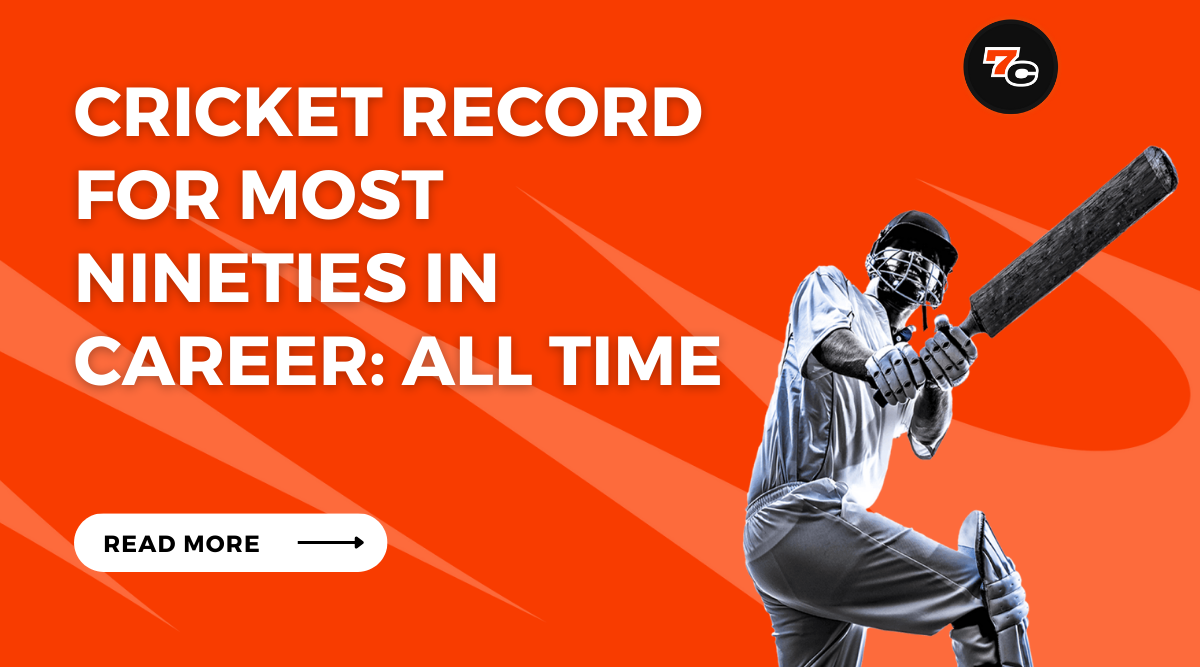
Numerous records have been set and subsequently broken in the sport of cricket, which is enjoyed by millions of people throughout the world.
The “Most Nineties in Career” category includes both One Day Internationals (ODIs) and Test matches, and it is notable because of the record it holds for having the most consecutive scores of ninety.
While not as impressive as a century or five-wicket haul, this achievement nonetheless holds a unique charm.
After all, it’s a sign of a player’s dedication to the century club if they’re always close but never quite able to achieve it.
Being awarded “Most Nineties in Career” is a testament to a cricketer’s ability to regularly play massive innings, but it also highlights the disappointment of being so close to scoring a century but falling just short.
In high-stakes games like one-day internationals and test matches, scoring in the 90s is a significant feat.
However, the anticipation and pressure of attaining the three-figure milestone can at times be too much to handle.
Those who have accumulated the most career 90s have shown grit, skill, and an instinctive ability to play deep into games.
Their adventures, which included both triumphs and setbacks, added a fresh chapter to cricket’s colorful and adventurous history.
The Importance of Being in Your Nineties
An outstanding performance in cricket would be one that results in a century. The desired triple digit score, however, does not happen every inning.
The nineties, namely the scores in the range (90–99), are interesting because they have their own special appeal. Scores close to but below 100 are indicative of a player’s consistency and skill.
Sachin Tendulkar was a phenomenal player throughout the ’90s
When it comes to scoring ninety in cricket, there is one guy who stands out from the rest of the galaxy like a blazing star.
That’s none other than Sachin Tendulkar, a legendary batsman from India. He has achieved an incredible 18 hundreds in international cricket, giving him the record for most hundreds ever scored in the game.
An Inside Look at Sachin Tendulkar’s Extraordinary Career
After joining the Indian national cricket team at age 16, Sachin swiftly rose to prominence as a premier batsman. His intelligence was on full display over a twenty year period.
He earned 100 centuries in his international career and finished with 34,357 runs. Even more impressive is the fact that he has “hundreds in consecutive matches from debut.”
Most Nineties in Career: ODI
Every batsman hopes to post a high score in an ODI. Their proficiency and perseverance have been validated throughout a century of service.
It’s a long and winding road, though, from 90 to 100 runs. When the heat is on, even the strongest of us can crack.
The players that have experienced the most “nervous nineties” throughout their ODI careers are the ones we’ll be focusing on today.
1. The Legend: Sachin Tendulkar (18 Times: 1989-2012)
Sachin Tendulkar, often at the pinnacle of batting records, tops this list too. Starting his ODI journey against Pakistan in 1989, he’s played 463 matches.
With a whopping 18,426 runs, 49 centuries, and 96 half-centuries, his records speak volumes. Yet, 18 times, he fell short in the nineties.
Imagine, “Hundreds in consecutive matches from debut” could have been his if not for these instances.
2. Zimbabwe’s Star: Grant Flower (9 Times: 1992-2010)
Zimbabwe gifted cricket with Grant Flower. A versatile player, he debuted against India in 1992. Across 221 ODI games, he’s amassed 6571 runs and taken 104 wickets.
Six centuries and 40 half-centuries adorn his career. However, the nineties tripped him up nine times.
3. New Zealand’s Opener: Nathan Astle (9 Times: 1995-2007)
Nathan Astle, a formidable opener, began his ODI career against the West Indies in 1995. In 223 matches, he’s scored 7090 runs.
His record boasts 16 centuries and 41 half-centuries. But, the nineties proved challenging, stopping him nine times.
4. Sri Lanka’s Captain: Aravinda de Silva (9 Times: 1984-2003)
Aravinda de Silva, a Sri Lankan gem, made his ODI debut against New Zealand in 1984. Over 308 matches, he’s scored 9284 runs.
His tally includes 11 centuries and 64 fifties. Yet, nine times, the nineties halted his march to a century.
5. South Africa’s All-Rounder: Jacques Kallis (8 Times: 1996-2014)
Jacques Kallis, arguably cricket’s best all-rounder, started his ODI career against England in 1996. Playing 328 ODIs, he’s scored 11,579 runs.
With 17 centuries and 86 half-centuries, his stats are impressive. But, eight times, he missed a century by a whisker.
Most Nineties in Career: Test Matches
A century is a significant milestone for any batsman in the sport of cricket. However, this is not a regular occurrence.
Getting to the three-figure mark is a great personal accomplishment, and it also boosts the team’s reputation. Nonetheless, the nervous nineties are a phenomenon that has been observed in cricket.
As a batsman gets closer to reaching 100 runs, the pressure on him or her to do so increases. Commonly, they have trouble getting past the 90-to-100 run mark, which limits their chances of reaching a century.
Both the player and the squad are going through a tough period right now. Let’s have a look at the players in test cricket history who have held this position the most often.
1. Sachin Tendulkar (10 times) – 1989 to 2013
Sachin Tendulkar, a legend in the sport of cricket, has a number of records. The fans were blown away by his batting, which was a great combination of technique and balance.
He holds the record for most century scored overall with 51 in Tests and 49 in One-Day Internationals.
However, during his remarkable career that spanned 200 games, he failed to reach the century mark in successive matches beginning with his debut and struggled with the nervous ninety ten times.
2. Rahul Dravid (10 times) – 1996 to 2012
The famous batting abilities of Rahul Dravid earned him the nickname “Mr. Wall.” After making his test cricket debut in 1996 against England, he quickly rose to become one of the game’s leading run scorers.
His record is remarkable given that he has scored 36 centuries and 63 fifties. Nevertheless, much like Tendulkar, Dravid faced the nervous nineties ten times during his career.
3. Steve Waugh (10 times) – 1985 to 2004
Another one of cricket’s all-time greats is Steve Waugh, who captained Australia in the past. In his first year as prime minister, 1985, he distinguished himself.
He made an everlasting imprint by scoring 32 centuries and 50 fifties during the course of his career. However, the tumultuous nineties did not spare him and visited him 10 times over his life.
The Peculiar Prestige of the Nineties in Cricket
Cricket has an abundance of records and statistics, and many of these focus on the greatness of hundreds and the magic of five-wicket hauls.
However, hidden among these illustrious achievements is the curious record of “Most Nineties in Career.” This record is interesting because it covers both One-Day Internationals and Tests.
The focus should not be solely on those who achieve ultimate success, but also on those who, time and time again, come perilously close.
An award like “Most Nineties in Career” can have mixed feelings. Reaching the 100-run mark is a rare feat, as it demonstrates a player’s exceptional consistency.
But it’s also a sobering reminder of all the times they came so close to breaking the magic hundred but fell just short.
In both ODIs and Test matches, this record serves as a monument to the mental toughness of the players. There was a lot of pressure on runners in the 1990s.
To successfully get through this testing period repeatedly takes not only competence but also tremendous psychological fortitude.
Finally, while hundreds will always be the pinnacle of batting performances, “Most Nineties in Career” has its own unique place in cricket’s colorful fabric.
This is a document that captures the spirit of perseverance and dedication, as well as the anguish of what might have been.
It is crucial for us, as fans and aficionados of the game, to recognize and honor the special narrative that these decades represent.
Since cricket is more about the game itself than the final score, it’s important to enjoy the process as much as the result.









